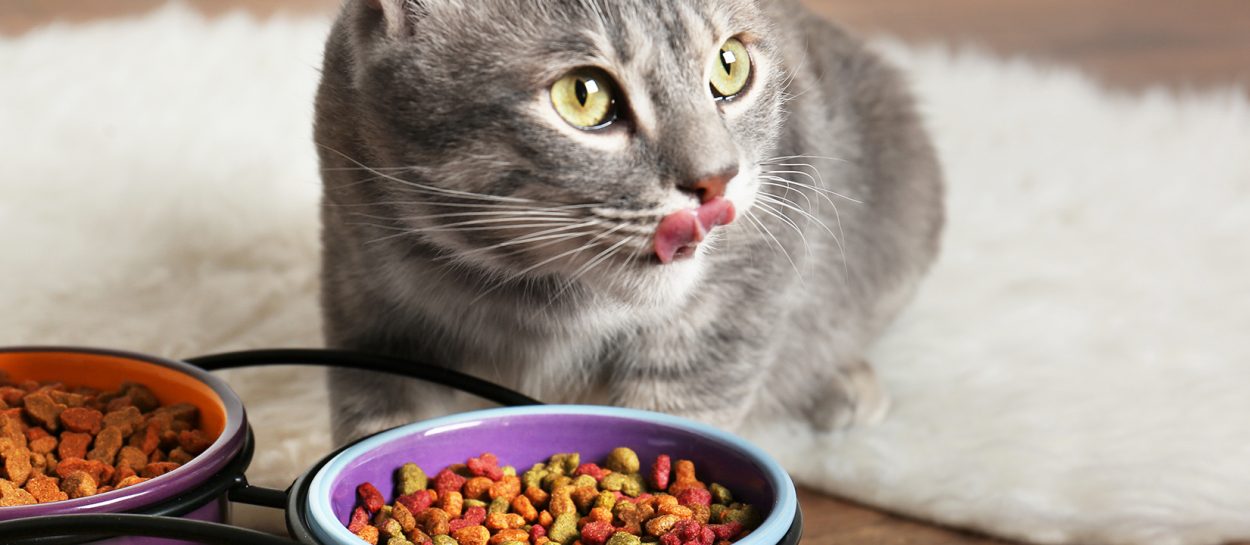
As a new kitty parent you’ll want to make sure your kitten starts life with the right nutritionally balanced food to ensure its grows into a healthy and happy cat. One of the first questions you will ask yourself is What should I feed my kitten?
To begin with you should always feed your kitten the food that they are currently eating for at least the first few days. Moving into a new home with new humans can be stressful and can affect a kittens’ digestive system. Keeping them on the same diet can significantly reduce the risk of stomach upsets and diarrhoea.
If you wish to change their diet after this period, do so over the course of 10 days. For example, days 1-3 25% new food, days 4-6 50% new food, days 7-9 75% new food and day 10 100% new food.
When deciding on what to feed your kitten it is important to remember that a kitten requires nutrient rich food to promote good health and normal growth. Proper nutrition is essential to grow your kitten’s rapidly developing brain, spinal cord, organs, tissues, and nervous system. You must also remember that cats are carnivores and as such require a high quality protein diet.
One of the golden rules is to always feed your kitten food that is specifically formulated for kittens. Do not feed them food meant for adult cats until they are at least 12 months old. Adult cat food does not include the vitamins and minerals necessary for the early developmental growth stages of a kitten.
What Ingredients Should be Included in Kitten Food?
A little kitten has high nutritional needs and again you should follow the rules of all carnivores.
Your kitten needs animal protein for tissue and energy growth. As a rule, kittens get around 30% of their energy from protein, so its important to choose foods that contain real lamb, beef, egg, poultry, fish or chicken meal.
A kitten’s food should also include DHA for eye and brain development, folic acid for cell growth and taurine, an essential amino acid.
For the proper development of the kitten’s nervous system, you should include essential fatty acids. These can be obtained from oily fish such as sardines and salmon. These should only be given every so often.
How Much Should you Feed your kitten?
Kittens need a lot of calories for tissue growth and development and of course for all that playing! They require more calories than a fully grown cat due to their rapid growth rate. Therefore , you need to make sure your kitten is getting the right amount of calories and nutrients each day.
Most commercial foods will have a guide as to how much to feed your kitten per day. However, if you want to be a more precise the recommendation is 200 kilocalories per day for a kitten weighing five pounds.
Keep an eye on your kitten. If you notice her becoming skinny or over weight, either adjust her diet or check in with your Veterinarian.
How Often Should I Feed my Kitten?
Due to the large number of calories a kitten needs and the size of their stomach it is recommended to feed them smaller meals more regularly. In order for them to absorb all the nutrients they need, it’s important to feed them 4 times a day, reducing feeds to twice a day at six months old.
Observe your cat when it eats, it may like to graze on and off during the day rather than eat at set meal times. This is ok as long as you are following the portion guidelines on the kitten food label.
What Food Types for Your Kitten?
There are generally 2 types of food choices to choose from when it comes to feeding your kitten. These are dry kitten food (kibble) and wet kitten food (canned food).
Wet Kitten Food
Cats are designed to get their water from their food. Mice contain around 70% water, canned food around 78% water and dry food 5% – 10% water. Therefore, wet kitten food is highly recommended. This is particularly true for indoors cats who do not have an opportunity to hunt.
Wet kitten food is also beneficial as it is not usual for cats to get a thirst sensation therefore, the high moisture content helps them to stay hydrated. Wet food can come in the form of raw food and canned or sachet food. Good quality wet cat food can be sourced from your veterinarian, local pet store or your supermarket. When looking for a good quality canned or sachet food, make sure to read the ingredients and look for lots of natural ingredients like real meat rather than fillers such as grain, corn and soy.
Dry Kitten Food
Dry kitten food or kibble has a very low moisture content however, it is dense in nutrients. The best dry kitten food to feed your kitten is a ‘super premium’ grade food. Compared to budget options found in the supermarket, super premium food is complete and balanced, vitamin rich and nutritionally dense with quality proteins, fats and carbohydrates.
While the super premium food is more expensive, a smaller portion is required to meet the kitten’s nutritional needs due to the high digestibility and calorie density.
Your kitten is able to take dry food once it is weaned from nursing at about 2- 4 weeks. To begin with offer the kitten dry kibble moistened in a bit of water. You can also mix it with a little bit of wet food to get the kitten through the weaning stage.
It’s beneficial for your kitten to have a mixture of both wet and dry food. The dry food is easily left out all day for your kitten to graze on, while wet food is ideally suited to serving at specific meal times. And always remember to leave several bowls of fresh water about the house for your kitten.
What Foods Shouldn’t You Give Your Kitten?
The following foods can be poisonous to your kitten and should always be avoided:
- onion
- garlic
- chives
- coffee
- tea
- alcohol
- grapes
- raisins
- chocolate
- raw eggs
- diary products
- yes! including milk!
- and of course the pet gold fish!

Leave a comment
This site is protected by hCaptcha and the hCaptcha Privacy Policy and Terms of Service apply.